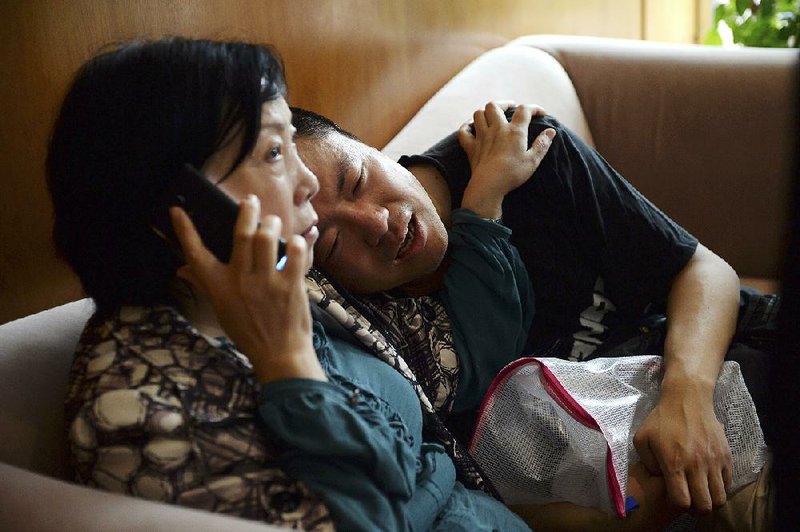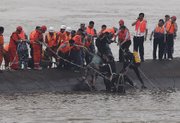JIANLI, China -- Rescue divers from across China converged on a remote stretch of the Yangtze River on Tuesday in a race to save people believed to be trapped inside the hull of a capsized cruise ship that had carried 456 passengers and crew members.
As of Tuesday evening, nearly a full day after the four-story Oriental Star capsized during high winds and heavy rain, only 14 people were known to have survived the accident.
The survivors included a 65-year-old woman, Zhu Hongmei, who was pulled from an air pocket inside the ship just after midday Tuesday. Divers briefly instructed her on how to use scuba equipment before guiding her into the muddy water and free of the overturned vessel, said Chen Shoumin, the commander of the local military district, who spoke at a televised briefing.
Late Tuesday, the official Xinhua News Agency lowered the number of people onboard to 456 from 458, and it said there were 14 survivors, down from an earlier report of 15. The agency did not explain why the numbers had changed. As of late Tuesday, 424 were still missing, the agency reported.
Eighteen bodies had been recovered, Xinhua reported, and many hundreds are thought to be inside the vessel. Chen said more people might be alive in the ship and that additional rescuers were on their way to the scene of the accident, in Jianli County in Hubei province in central China, with plans for 183 divers to be there by today.
Other rescue workers were seen on state television tapping hammers on the hull, then listening for a response that could indicate survivors.
Premier Li Keqiang arrived at the scene Tuesday, Xinhua reported. Xinhua and other state media outlets showed pictures of him giving instructions to the rescue crews. News organizations reported that Xi Jinping, the country's president and the party's leader, had "issued important instructions immediately" to direct rescue operations.
"This shows that the party and the government, they genuinely care about the people," Chen said.
But some anxious relatives of the passengers disputed that, saying they had been kept in the dark.
The offices of the Xiehe Tourism Agency in Shanghai, where many of the tourists had booked their trips, were closed Tuesday with a note taped to the door saying the managers had gone to the site of the accident.
Grieving family members who had shown up at the office were sent by officials to a local petition bureau and told to wait there. Many of them were angry that the government had not provided them with information about the accident or a list of possible victims.
"They don't want to tell us anything, and they treat us like we're going to do something bad," said a woman with the surname Chen, who said three of her sisters and two brothers-in-law were believed to have been on the Oriental Star with 14 other members of a tour group. "We just want to know where they are. Our family lost five people."
When a man who appeared to be a higher-ranking official arrived at the bureau, some relatives shouted at him and followed him, demanding answers. Others jostled with staff members at the bureau after they were told not to talk with news media.
The captain of the Oriental Star, who has not been identified, was rescued from the river Monday night. Both the captain and the chief engineer were taken into police custody and said during questioning that the ship capsized when it was hit by a tornado, according to reports in the state-run media.
Tornadoes are not as common in China as in the United States, but the China Meteorological Administration said Tuesday that a tornado had been reported in the area around the time the ship capsized. Wind speeds reached 12 on the Beaufort Scale, which translates to 74 mph, for 15 to 20 minutes, the administration said in an email. Between 9 and 10 p.m. Monday, about 21/2 inches of rain fell in the area, it said.
Tuesday night, police officers had set up a checkpoint on the main road leading into the town of Jianli, the county seat. Many residents stood holding umbrellas while various rescue and civilian vehicles remained parked in the vicinity or waited in line at the checkpoint.
Qin Jianli, 48, from the nearby village of Xinzhou, drove on a scooter with his young son from the direction of the rescue site.
"It's been busy all day today," he said. "Last night around 9:30, the wind began blowing hard, with lots of lightning. It blew so hard it destroyed some homes in my village.
"The wind swirled in a twisted shape."
Information for this article was contributed by David Barboza, Keith Bradsher, Kiki Zhao, Mia Li, Adam Wu and Vanessa Piao of The New York Times.
A Section on 06/03/2015

